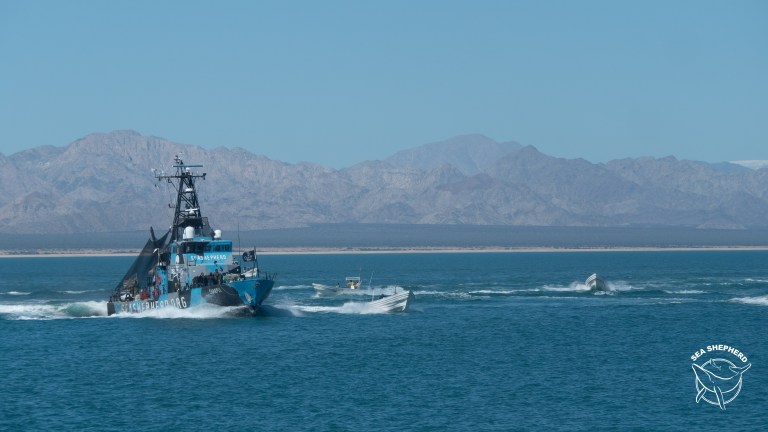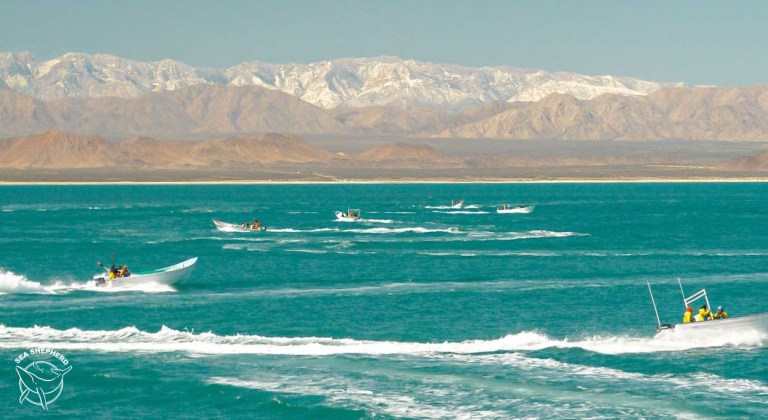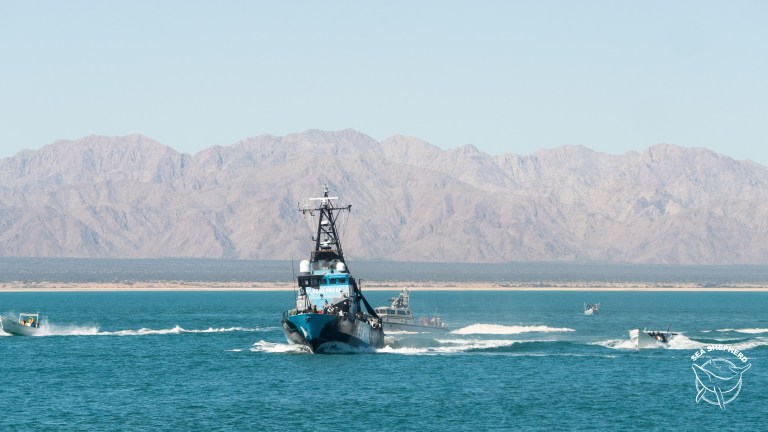Sea Shepherd Attacked On World Wildlife Day By Poachers In Vaquita Refuge
On the morning of March 3rd, World Wildlife Day, Sea Shepherd crews were confronted by a large group of skiffs fishing illegally inside the Vaquita Refuge, a UNESCO World Heritage Site located in Mexico’s Upper Gulf of California.
Two Mexican naval ships, a defender and an interceptor were present at the time of the attack and provided support to the conservation vessels.
The incident began at approximately 08:40 AM inside the Vaquita Refuge, a federally protected region that is home to the critically endangered vaquita porpoise. During routine monitoring of the area, Sea Shepherd crews encountered two skiffs actively retrieving a gillnet in this no-fishing zone and approached the vessels. Mexican authorities from the Federal Attorney for Environmental Protection (PROFEPA) and the National Commission of Fisheries and Aquaculture (CONAPESCA) on board the M/V Sharpie asked the fishermen to remove the net from the refuge. The skiffs refused.

Four more skiffs arrived on the scene and began efforts to retrieve a second totoaba gillnet from the area. Additional skiffs continued to aggregate and at 10:20 AM, the group launched an organized attack, surrounding the M/V Sharpie, the M/V Farley Mowat, and the military ships.
Approximately 20-25 skiffs swarmed the Sea Shepherd vessels, throwing rocks, lead weights, and other objects at the conservation ships in an effort to force them to leave the area. Poachers on board one skiff launched a molotov cocktail at the starboard side of the M/V Sharpie but were not able to successfully hit the ship.
At least one minor was present on the skiffs involved in the attack.
Sea Shepherd carried out anti-piracy procedures, including high-speed maneuvering and the defensive use of water cannons. As poachers attempted to light a second molotov cocktail, military personnel on board the M/V Sharpie fired a warning shot, at which time the skiffs disbanded and the attack ended.

There were no injuries or damage to the ships during the incident.
“Today’s events show the unfortunate lows that the poachers will sink, to achieve their goals of pillaging our oceans,” said Sea Shepherd Captain Octavio Carranza in a statement.
This is not the first time Sea Shepherd has been attacked by poachers in the Vaquita Refuge. In February 2020, shots were fired at Sea Shepherd’s M/V Sharpie. In January 2019, Sea Shepherd vessel the M/V Farley Mowat was attacked by a mob of over 50 skiffs, who hurled rocks and molotov cocktails at the ship, breaking its windows and setting its hull on fire. Also in January 2019, poachers illegally boarded the M/V Farley Mowat.
This recent attack shockingly took place on World Wildlife Day, a day of international celebration of the diversity of animal life on Earth.
“Today, on World Wildlife Day, I watched a young child throw lead weights at our ship during an attack,” said Sea Shepherd Captain Jacqueline Le Duc in a statement. “Witnessing this firsthand was extremely sad. Sea Shepherd is here to save a species on the brink of extinction so that future generations can continue to enjoy the biodiversity this area has to offer. We should be teaching younger generations the importance of the conservation of nature, not the exploitation of it.”

Illegal fishing is one of the biggest threats to the world’s oceans and is the reason the vaquita is facing imminent extinction. There are less than 20 vaquitas left alive, and gillnets are the primary threat to the survival of this species.
Poachers set gillnets in the area in an effort to catch totoaba, a protected species whose swim bladders sell for a high price on the Chinese black market. Vaquitas fall victim to these nets and are caught as bycatch.
Sea Shepherd has been working with Mexican authorities for the past six years, removing the illegal gillnets that threaten the survival of the vaquita and all marine life in the area. To date, over 1,000 pieces of illegal fishing gear have been removed from the Vaquita Refuge, directly saving the lives of over 4,000 animals.
You can help all animals and our planet by choosing compassion on your plate and in your glass. #GoVeg